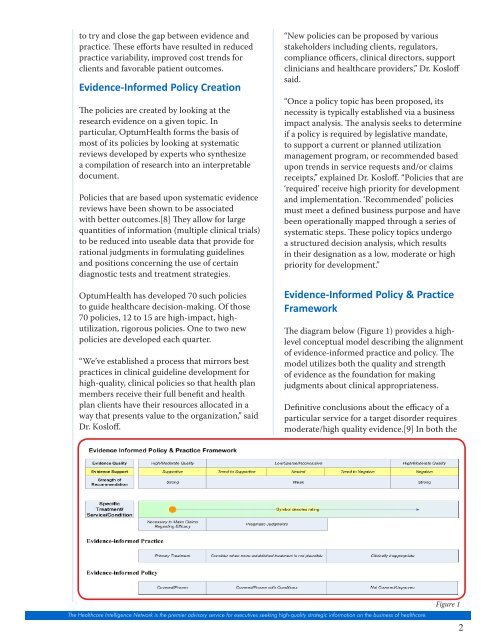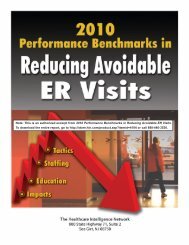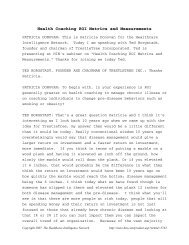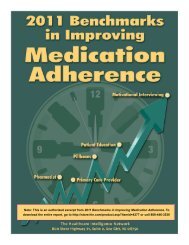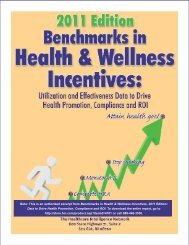Evidence-Based Policies Inform Healthcare Decisions, Reduce ...
Evidence-Based Policies Inform Healthcare Decisions, Reduce ...
Evidence-Based Policies Inform Healthcare Decisions, Reduce ...
You also want an ePaper? Increase the reach of your titles
YUMPU automatically turns print PDFs into web optimized ePapers that Google loves.
to try and close the gap between evidence and<br />
practice. These efforts have resulted in reduced<br />
practice variability, improved cost trends for<br />
clients and favorable patient outcomes.<br />
<strong>Evidence</strong>-<strong>Inform</strong>ed Policy Creation<br />
The policies are created by looking at the<br />
research evidence on a given topic. In<br />
particular, OptumHealth forms the basis of<br />
most of its policies by looking at systematic<br />
reviews developed by experts who synthesize<br />
a compilation of research into an interpretable<br />
document.<br />
<strong>Policies</strong> that are based upon systematic evidence<br />
reviews have been shown to be associated<br />
with better outcomes.[8] They allow for large<br />
quantities of information (multiple clinical trials)<br />
to be reduced into useable data that provide for<br />
rational judgments in formulating guidelines<br />
and positions concerning the use of certain<br />
diagnostic tests and treatment strategies.<br />
OptumHealth has developed 70 such policies<br />
to guide healthcare decision-making. Of those<br />
70 policies, 12 to 15 are high-impact, highutilization,<br />
rigorous policies. One to two new<br />
policies are developed each quarter.<br />
“We’ve established a process that mirrors best<br />
practices in clinical guideline development for<br />
high-quality, clinical policies so that health plan<br />
members receive their full benefit and health<br />
plan clients have their resources allocated in a<br />
way that presents value to the organization,” said<br />
Dr. Kosloff.<br />
“New policies can be proposed by various<br />
stakeholders including clients, regulators,<br />
compliance officers, clinical directors, support<br />
clinicians and healthcare providers,” Dr. Kosloff<br />
said.<br />
“Once a policy topic has been proposed, its<br />
necessity is typically established via a business<br />
impact analysis. The analysis seeks to determine<br />
if a policy is required by legislative mandate,<br />
to support a current or planned utilization<br />
management program, or recommended based<br />
upon trends in service requests and/or claims<br />
receipts,” explained Dr. Kosloff. “<strong>Policies</strong> that are<br />
‘required’ receive high priority for development<br />
and implementation. ‘Recommended’ policies<br />
must meet a defined business purpose and have<br />
been operationally mapped through a series of<br />
systematic steps. These policy topics undergo<br />
a structured decision analysis, which results<br />
in their designation as a low, moderate or high<br />
priority for development.”<br />
<strong>Evidence</strong>-<strong>Inform</strong>ed Policy & Practice<br />
Framework<br />
The diagram below (Figure 1) provides a highlevel<br />
conceptual model describing the alignment<br />
of evidence-informed practice and policy. The<br />
model utilizes both the quality and strength<br />
of evidence as the foundation for making<br />
judgments about clinical appropriateness.<br />
Definitive conclusions about the efficacy of a<br />
particular service for a target disorder requires<br />
moderate/high quality evidence.[9] In both the<br />
The <strong>Healthcare</strong> Intelligence Network is the premier advisory service for executives seeking high-quality strategic information on the business of healthcare.<br />
Figure 1<br />
2


